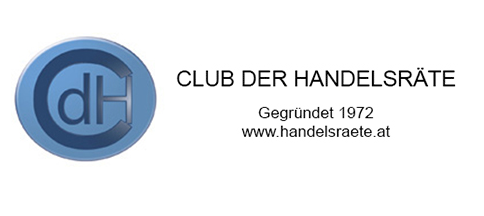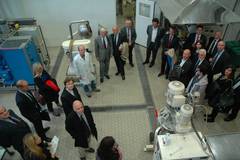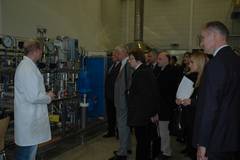BOKU
The University of Natural Resources and Life Sciences Vienna, known by its acronym BOKU, which we visited in October 2013, offers study courses and carries out research with an emphasis on environmental matters and the protection of natural resources.
Univ.Prof. Dr. Josef Glößl, Vice Rector for Research and International Research Collaboration, welcomed the trade delegates at Muthgasse 11, one of the BOKU sites (other sites are Türkenschanze, and Tulln, close to Vienna). With sustainability as a key element of the corporate goal, the teaching and research institution with about 11.500 students (18% foreign students), focuses on living resources that are a prerequisite for human existence. For BOKU, interaction with scientists in neighbouring countries is a crucial aspect in the planning of our region's common future.
"With its wide range of areas of expertise, it is the task of BOKU to contribute significantly to the protection of life resources for future generations", Prof. Glößl, explained in his overview about the various BOKU-activities: "With a connection between natural sciences, engineering and economics, BOKU is trying to deepen the knowledge of an ecologically and economically sustainable use of natural resources in a cultivated landscape."
BOKU also offers International Master Programs in English, such as: Applied Limnology - Wetland Management, Natural Resources Management and Ecological Engineering, European Forestry, Safety in the Food Chain, Material and Thermal Utilization of Renewable Raw Materials, Environmental Sciences - Soil, Water and Biodiversity.
The Centre for Development Research, in short 'CDR', is a university unit with a multidisciplinary network of over twenty partner scientists. It conducts applied development research and training in areas related to sustainable natural resource management. The CDR works towards poverty reduction, food security, and well-being for the most vulnerable populations: "We collaborate with a wide range of partners in Africa, Asia and Latin America", Prof. Glößl told the trade delgates.
In an extensive guided tour, led by Mag. Rudolf Pollak, site coordinator Muthgasse, the club visited the Department of Food Science and Technology, which plays an important role within the BOKU's field of expertise in food, nutrition and health. Head of Department, Univ.Prof. Dipl.Ing. Dr.nat.techn. Wolfgang Kneifel, told the trade delegates: "Our researchers focus on the specific consumer needs and the whole food supply chain, ensuring safe and high grade foods."
The trade delegates also got the opportunity to take a look at the unique biotech pilot plant, used as a training lab. and also for the production of proteins and glycoproteins for therapeutic, diagnostic and industrial use, and plant cells for the production of biopharmaceuticals.
In the Department of Water Management and Environmental Engineering, where students acquire knowledge and skills in the areas of hydrology, water management planning, constructive hydraulic engineering and river management, the trade delegates took a closer look at the Hydraulic Lab / Lab of Sanitary Engineering, where several model studies are carried out.
Finally, at the "Faculty Club" the researches joined the trade delegates, enjoying a glass of wine - made by BOKU--students - and discussed some recent research results.







